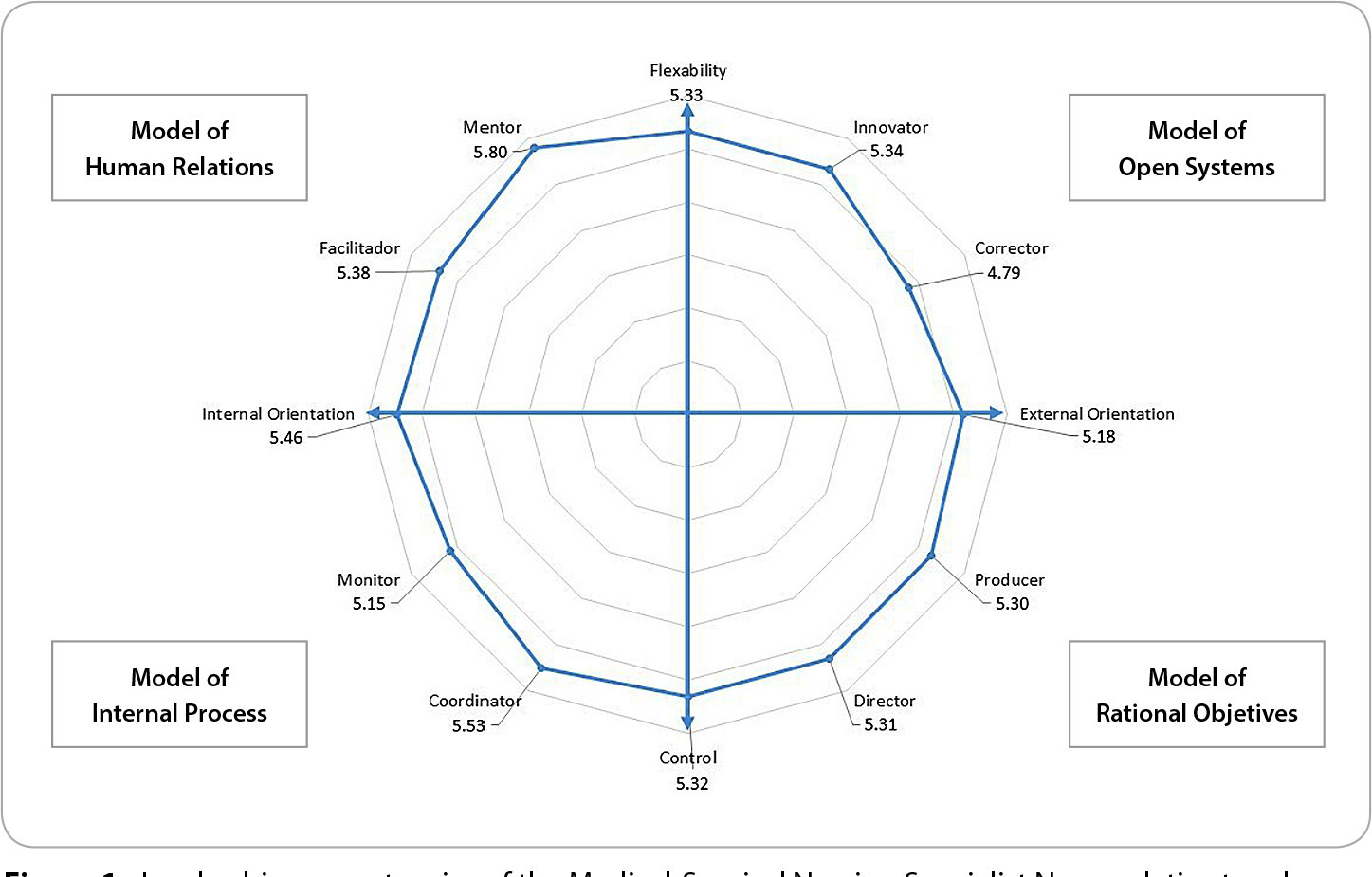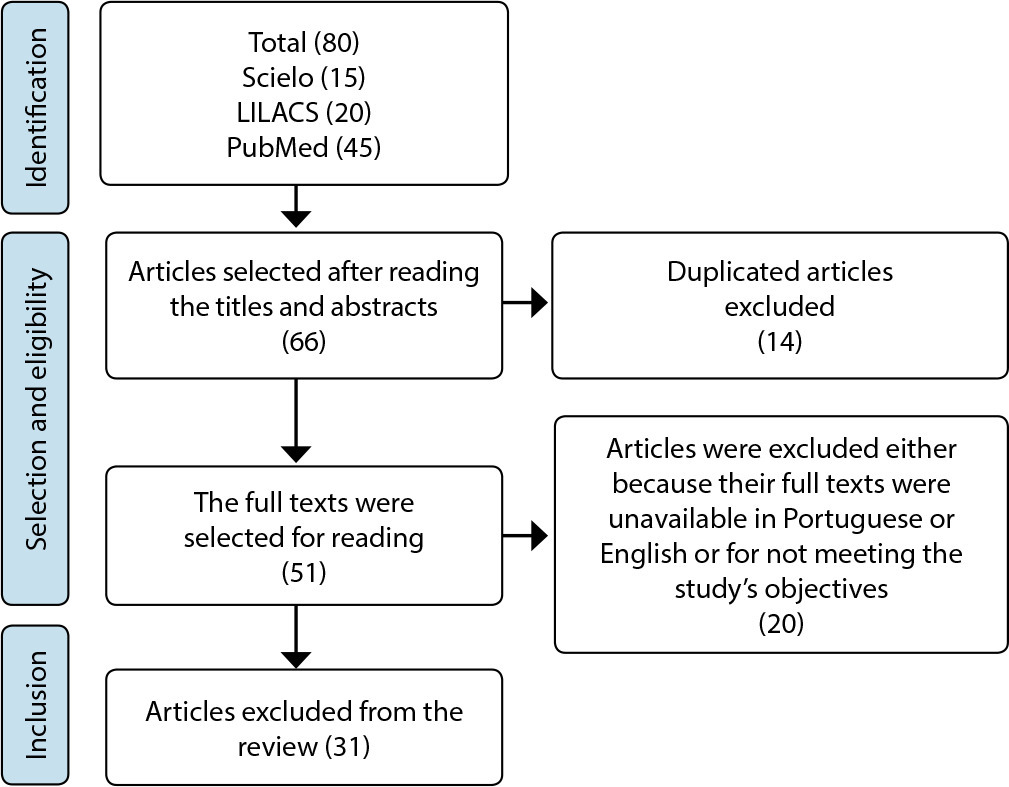-
ORIGINAL ARTICLE
Leadership styles and personal values of professors at a school of nursing
Revista Brasileira de Enfermagem. 2024;77(5):e20230333
08-26-2024
Resumo
ORIGINAL ARTICLELeadership styles and personal values of professors at a school of nursing
Revista Brasileira de Enfermagem. 2024;77(5):e20230333
08-26-2024DOI 10.1590/0034-7167-2023-0333
Visualizações0Ver maisABSTRACT
Objectives:
to identify professors’ leadership styles and personal values.
Methods:
a quantitative, descriptive-exploratory study. Population was made up of professors in doctoral category 1 at a public university in the state of São Paulo. Data collection took place from June to August 2021. Sociodemographic characterization was extracted, and the Leadership Team Values Assessment was applied. Data were analyzed using measures of central tendency.
Results:
population included 13 professors. The level that represents authentic leadership was the most prevalent. The commitment, positive attitude and trust values stood out. The level portrayed by visionary leadership was the least identified.
Conclusions:
professors’ personal values provide a theoretical basis for guiding and analyzing professors’ leadership styles. Leadership in the educational context must be recognized and studied to promote a more comprehensive and effective approach to developing and improving educational leaders.

-
ORIGINAL ARTICLE
Nursing students’ perception: Escape Room use in teaching leadership skills
Revista Brasileira de Enfermagem. 2024;77(2):e20230414
07-19-2024
Resumo
ORIGINAL ARTICLENursing students’ perception: Escape Room use in teaching leadership skills
Revista Brasileira de Enfermagem. 2024;77(2):e20230414
07-19-2024DOI 10.1590/0034-7167-2023-0414
Visualizações0Ver maisABSTRACT
Objectives:
to understand nursing students’ perception regarding Escape Room use to develop leadership skills.
Methods:
a qualitative exploratory-descriptive study, with 97 nursing students. Escape Room game sessions were held, totaling ten. Subsequently, a debriefing and analysis was carried out using the Discourse of the Collective Subject method, through the focus group technique. Ethical procedures were respected.
Results:
students’ perceptions about using this methodology to develop leadership skills were positive and significant. The effectiveness of the game in teaching and developing these skills in nursing practice stands out.
Final Considerations:
the game was an effective active methodology in approaching the proposed content, promoting satisfaction and easy assimilation.
-
ORIGINAL ARTICLE
Nursing leadership strategies in addressing COVID-19 in light of John Kotter’s framework
Revista Brasileira de Enfermagem. 2024;77(Suppl 1):e20230289
06-28-2024
Resumo
ORIGINAL ARTICLENursing leadership strategies in addressing COVID-19 in light of John Kotter’s framework
Revista Brasileira de Enfermagem. 2024;77(Suppl 1):e20230289
06-28-2024DOI 10.1590/0034-7167-2023-0289
Visualizações0Ver maisABSTRACT
Objective:
To analyze the leadership strategies of nurses in university hospitals in response to care management changes during the COVID-19 pandemic, informed by John Kotter’s insights.
Methods:
This multicentric study utilized qualitative and analytical methods. It was conducted through semi-structured interviews with 139 lead nurses from 10 university hospitals in Brazil. Data analysis included Bardin’s content analysis and the webQDA software.
Results:
The primary category identified was “Nursing Leadership Strategies in the Battle Against COVID-19,” encompassing five subcategories. This category underscored the importance of strategic vision in nursing leadership for combating COVID-19 within hospital settings, as well as the necessity of working collaboratively with their teams and other healthcare professionals.
Final Considerations:
The results highlight the strategies used by lead nurses in confronting COVID-19, which can be associated with John Kotter’s theoretical framework and his model of change.
-
ORIGINAL ARTICLE
Nurses’ perception of the nursing process and its relationship with leadership
Revista Brasileira de Enfermagem. 2024;77(1):e20230371
04-22-2024
Resumo
ORIGINAL ARTICLENurses’ perception of the nursing process and its relationship with leadership
Revista Brasileira de Enfermagem. 2024;77(1):e20230371
04-22-2024DOI 10.1590/0034-7167-2023-0371
Visualizações0Ver maisABSTRACT
Objectives:
to describe Nurses’ perception of the Nursing Process and its relationship with leadership.
Methods:
action research conducted between September/2021 and April/2022 with nurses from a medium-sized hospital in southern Brazil. The data investigated, one of the stages of the method, was collected using the Focus Group technique and submitted to Strategic Focus Analysis.
Results:
three categories emerged from the organized and analyzed data, namely: Nursing Process: a tool that qualifies nursing care; Conditions that weaken the Nursing Process; and Strategies that enhance the Systematization of Nursing Care.
Final Considerations:
the perception of the Nursing Process and its relationship with leadership are not always understood as complementary themes. Although they recognize that the Nursing Process is sometimes imposed as normative, nurses do not perceive the importance of the role of the leader, who is considered a key player in conducting and boosting the Systematization of Nursing Care.

-
ORIGINAL ARTICLE
Leadership Competencies of the Medical-Surgical Nursing Specialist Nurse
Revista Brasileira de Enfermagem. 2023;76(6):e20220721
12-04-2023
Resumo
ORIGINAL ARTICLELeadership Competencies of the Medical-Surgical Nursing Specialist Nurse
Revista Brasileira de Enfermagem. 2023;76(6):e20220721
12-04-2023DOI 10.1590/0034-7167-2022-0721
Visualizações0Ver maisABSTRACT
Objective:
To identify the leadership competencies of Medical-Surgical Nursing Specialist Nurses.
Methods:
A quantitative, descriptive study using the Leadership Competencies Questionnaire. 311 Portuguese Medical-Surgical Nursing Specialist Nurses participated. Data analysis involved descriptive and inferential statistical analysis using the Statistical Package for Social Sciences (SPSS), version 22.0.
Results:
Study participants had an above-average self-perception on the scale (mean = 3.5) in all leadership roles, recognizing their leadership competencies. The leadership competencies of Medical-Surgical Nursing Specialist Nurses are balanced across all roles: Mentor (5.80 ± 1.02); Coordinator (5.53 ± 0.86); Facilitator (5.38 ± 1.04); Innovator (5.34 ± 0.88); Director (5.31 ± 1.10); Producer (5.30 ± 0.98); Monitor (5.15 ± 1.00); Corrector (4.79 ± 1.29)
Conclusions:
Specialized nursing practice enhances nurses’ self-perceived leadership competencies. Nurses see themselves as leaders focused on internal support and facilitation of collective effort and opportunities for skill development.

-
REVIEW
Authentic leadership in nurses’ professional practice: an integrative review
Revista Brasileira de Enfermagem. 2022;75(1):e20210972
10-17-2022
Resumo
REVIEWAuthentic leadership in nurses’ professional practice: an integrative review
Revista Brasileira de Enfermagem. 2022;75(1):e20210972
10-17-2022DOI 10.1590/0034-7167-2021-0972
Visualizações0Ver maisABSTRACT
Objectives:
to identify the primary constructs concerning authentic leadership and its relevance for nurses’ professional practice.
Methods:
integrative literature review conducted between 2015 and 2020 in LILACS, SciELO, and PubMed databases.
Results:
the United States published most of the 31 studies analyzed, with eight studies (25.8%), followed by Canada with seven studies (22.6%), and Brasil with five (16.1%). Most studies adopted a quantitative approach (77.41%), and 96.8% presented weak evidence. Three categories emerged: Work Engagement/Job Satisfaction and Organizational Commitment; Healthy Work Environment; and Intention to Quit the Job and Mental Exhaustion.
Final Considerations:
authentic leadership positively contributes to management and nursing care practice, promoting healthy work environments, structural empowerment, greater work engagement, and organizational commitment, decreasing absenteeism and mental exhaustion.

-
REVIEW
Authentic leadership in the educational system and in nursing education: an integrative review
Revista Brasileira de Enfermagem. 2022;75(1):e20220122
09-19-2022
Resumo
REVIEWAuthentic leadership in the educational system and in nursing education: an integrative review
Revista Brasileira de Enfermagem. 2022;75(1):e20220122
09-19-2022DOI 10.1590/0034-7167-2022-0122
Visualizações0Ver maisABSTRACT
Objectives:
to identify and analyze the knowledge produced in literature about authentic leadership in the educational system, as well as in nursing education.
Methods:
an integrative review, carried out in the Scopus, Web of Science, CINAHL, MEDLINE/PubMed, ERIC, LILACS databases. Articles that addressed authentic leadership in the educational system from a general perspective and within the nursing scope, as well as teaching practices of this leadership model, were eligible.
Results:
twenty-three articles met the inclusion criteria, most published in 2019, highlighting studies in the context of teaching, with a predominance in the nursing course and which were synthesized into three thematic categories.
Final Considerations:
it was found that the higher the levels of authentic leadership in the educational system, the higher the rates of other positive factors related to it, such as trust, involvement, academic optimism, responsibility, creativity, among others.

-
ORIGINAL ARTICLE
Nursing in Primary Health Care: association between leadership, psychological capital, and burnout implications
Revista Brasileira de Enfermagem. 2022;75(suppl 3):e20210942
07-18-2022
Resumo
ORIGINAL ARTICLENursing in Primary Health Care: association between leadership, psychological capital, and burnout implications
Revista Brasileira de Enfermagem. 2022;75(suppl 3):e20210942
07-18-2022DOI 10.1590/0034-7167-2021-0942
Visualizações0Ver maisABSTRACT
Objectives:
to verify the association between authentic leadership and burnout syndrome in Primary Health Care nursing professionals and analyze the relationship between positive psychological capital and burnout syndrome in subordinate nursing professionals.
Methods:
a field, descriptive-exploratory, cross-sectional study with a quantitative approach, developed with the nursing team, in Basic Health Units in the city of São Paulo, with the application of the sociodemographic questionnaires, Burnout Characterization Scale [Escala de Caracterização do Burnout], Authentic Leadership Questionnaire and Psychological Capital Questionnaire.
Results:
in leaders’ perception, there was no evidence of significant associations between burnout and authentic leadership scales. There was a significant negative association of the burnout scale dimensions with the leadership dimensions regarding the subordinates. There was evidence of significant negative associations in the burnout scores with the scores of the psychological questionnaire dimensions.
Conclusions:
in nursing, burnout is associated with authentic leadership and psychological capital.



